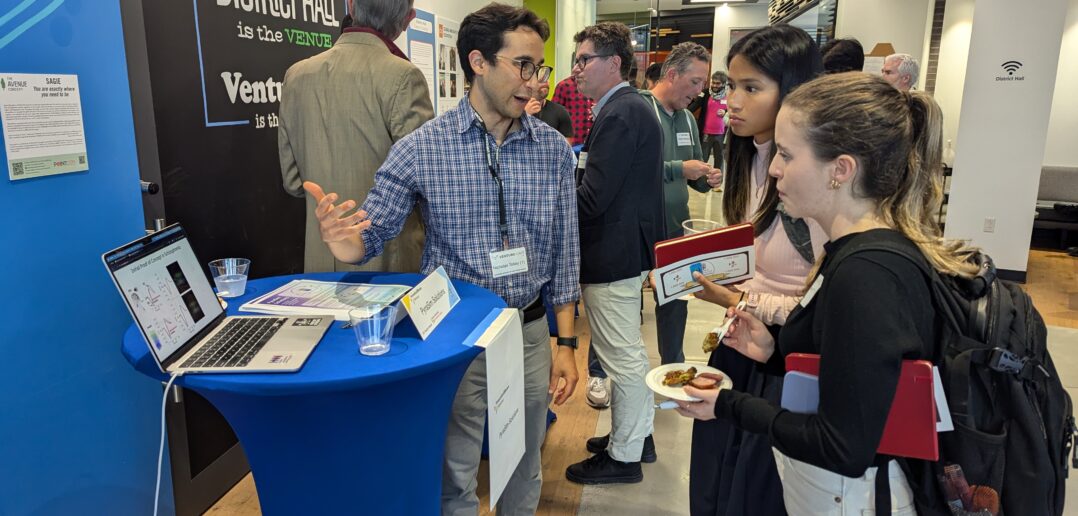Annual showcase highlights the work of Rhode Island researchers and entrepreneurs.
From brain circuit simulations to RNA and antibody therapeutics to AI tools for interior design, more than 20 early companies and pre-companies pitched their inventions at last week’s second annual Innovation@Brown Showcase at Venture Café Providence.
The event, held during Rhode Island Startup Week, includes discussion panels, networking opportunities for entrepreneurs to meet with investors, researchers, and local leaders, and an awards ceremony.
Wafik El-Deiry, MD, PhD, associate dean for oncologic sciences, and Kimani Toussaint, PhD, senior associate dean for research and strategic initiatives at theBrown School of Engineering, each received the Inventor of the Year Award.
Toussaint, director of the Photonics Research of Bio/Nano Environments lab, also received the Innovation of the Year Award in recognition of his work to build a new pulse oximeter that corrects skin color bias. El-Deiry, the director of the Legorreta Cancer Center, has 19 issued patents and founded three start-up companies based on his discoveries. Earlier this year the National Academy of Inventors named him to its 2024 class of Senior Members.
Among this year’s participants included companies and pre-companies like Bolden Therapeutics, co-founded by Johnny Page ’18 ScM’19 MD’25, Justin Fallon, PhD, professor of medical science and of psychiatry and human behavior; and former Brown professor Ashley Webb, PhD. Bolden is developing an RNA-based therapy to increase neurogenesis and improve outcomes in neurological conditions, and has secured more than $1 million in private and public funding.
Adept Materials, founded by Derek Stein, PhD, professor of physics (research), showcased its moisture control technology for use in industries like construction and health care. Products from the Brown HCI Research Group under Jeff Huang, PhD, associate professor and associate chair of computer science, also presented their work.
This year’s event focused on trends in AI in the health care and technology sectors, while local officials and Brown faculty and staff touted the transformation of Providence and Rhode Island as a hub for life sciences.
“As I read about AI, it’s a thread through everything—in doing research, producing therapeutics faster, in the treatment of patients—that will be woven throughout this,” said Neil Steinberg, chairman of the board of directors of the Rhode Island Life Science Hub. “Whether it’s cancer research, RNA, medical devices, or neuroscience, we have the talent and the research here. We’ve got to keep the companies here and translate this into our economy.”
“The City of Providence and Brown are working better together today than they’ve ever worked before,” added Providence Mayor Brett Smiley. “We’re working hand in glove to support their thrilling life science initiative that’s about to be built right behind us.”
Smiley was referring to the Jewelry District construction site for the William A. and Ami Kuan Danoff Life Sciences Laboratories, the seven-story, 300,000-square-foot building that, upon completion, will have capacity to provide lab space for roughly 700 life sciences researchers.
J.D. Kleinke, an entrepreneur in health care information, addressed some of the impacts of AI on health care and providers. He said AI represents a watershed moment in health care, as it can process large volumes of data to determine better routes of care. He pointed to the difficult work of examining and transferring immense volumes of paper medical records, and said AI has the potential to save time and money for patients and clinicians alike.
“We can look at that real, unstructured data, and we can actually get the right care to the right patient at the right time,” Kleinke said.




